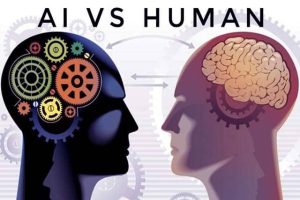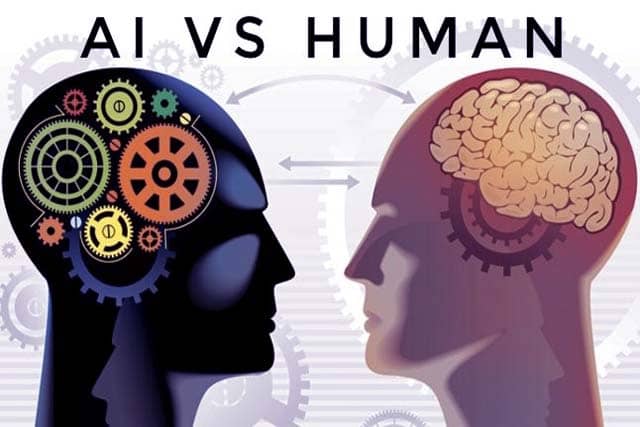AI vs Human brain
AI is capable of handling data-driven, repetitive tasks and providing data-based results. Human intelligence is capable of handling creative, emotional, and extremely difficult jobs. AI (Artificial Intelligence) and the human brain are fundamentally different, with each having its own unique strengths and limitations. Comparing the two involves examining various aspects, such as processing power, learning abilities, and specific applications. Here’s a brief comparison:

Processing Power:
AI: AI systems excel at processing vast amounts of data quickly and accurately. They can perform complex mathematical calculations, data analysis, and pattern recognition with unmatched precision and speed.
Human Brain: The human brain, on the other hand, is exceptionally powerful in terms of parallel processing and adaptability. It processes information in a massively parallel manner, allowing for complex, context-aware thinking.
Learning and Adaptation:
AI: AI systems, particularly machine learning models, can learn from data and improve their performance over time. They can generalize from training data to make predictions or decisions in new situations.
Human Brain: The human brain is unparalleled in its ability to learn, adapt, and generalize. It can make sense of novel, unstructured data and apply knowledge to a wide range of situations, often without explicit training.
Creativity and Innovation:
AI: AI systems can generate creative outputs, such as art, music, and literature. They can also optimize solutions based on defined criteria, leading to innovations in various fields.
Human Brain: Human creativity and innovation are deeply rooted in emotions, experiences, and consciousness, making them highly complex and diverse. Humans can create art, literature, and technology that reflect their unique perspectives and feelings.
Emotional Intelligence and Empathy:
AI: While AI can recognize and respond to basic emotional cues, it lacks genuine emotions, empathy, and a deep understanding of human emotions and context.
Human Brain: Humans possess emotional intelligence, the ability to empathize, and a deep understanding of complex emotions and social dynamics, which are vital for interpersonal relationships.
Common Sense and Contextual Understanding:
AI: AI systems often struggle with common-sense reasoning and understanding context. They rely heavily on structured data and struggle with ambiguity.
Human Brain: Humans naturally grasp common-sense reasoning, context, and nuances, allowing them to adapt to a wide range of situations and understand language in a nuanced way.
Energy Efficiency:
AI: AI systems, particularly deep learning models, consume a significant amount of energy for their operations.
Human Brain: The human brain is highly energy-efficient, using relatively low power to perform complex cognitive tasks.
Bias and Ethical Considerations:
AI: AI systems can inherit biases present in the training data, raising ethical concerns and challenges in achieving fairness and impartiality.
Human Brain: Humans have the ability to reflect on and adapt their beliefs, attitudes, and behaviors based on moral and ethical considerations.
In summary, AI and the human brain serve different purposes and have distinct capabilities. While AI excels in data processing, learning from data, and performing specific tasks with precision, the human brain remains unmatched in its adaptability, emotional intelligence, creativity, common-sense reasoning, and understanding of complex, unstructured information. The two complement each other in various applications, with AI enhancing specific tasks and the human brain providing the contextual and emotional understanding that AI lacks.

0 comments on “AI vs Human brain”